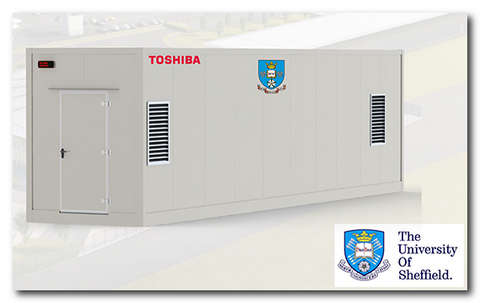Displaying items by tag: storage
BATTERY - Giant battery to help tackle energy storage challenges
The UK’s first two megawatt (MW) lithium titanate battery is to be connected to the grid later this year, as part of new research to tackle the challenges of industrial-scale energy storage. The project – led by the University of Sheffield and – aims to test the technological and economic challenges of using large scale batteries to provide support to the grid.

Energy generators worldwide are increasingly looking at installing large scale batteries, mainly for storing excess electricity from renewable sources, but their high capital costs and uncertainties over how they might work commercially has meant uptake of the technology is still low.
The research team believe that batteries could provide a cheap and easily automated way to store excess energy from the grid and respond quickly in times of high demand. The giant battery will form part of a new 11kV Grid Connected Energy Storage Research Demonstrator based at the Willenhall primary substation, near Wolverhampton in the West Midlands, which is part of the Western Power Distribution’s network. The demonstrator, funded by the Engineering and Physical Sciences Research Council, is due to open in October 2014, will also test the viability of used electric vehicle battery packs for domestic or industrial electricity storage.
Professor Dave Stone from the University of Sheffield’s Faculty of Engineering, said: “Large scale batteries could reduce the need to keep energy generators on standby to respond to peaks in demand, but it’s as yet unclear how this might be best managed commercially. Because this is a dedicated research facility, we’ll be able to explore the advantages of grid connected energy storage in a real operating environment, but without commercial constraints. We’ll be able to openly assess the impacts of the technology on our energy infrastructure, which should ensure faster adoption by the sector, to help improve how the grid functions and its overall stability.”
The lithium titanate battery – supplied by Toshiba – was chosen because it is faster to charge, longer lasting and much safer than its common alternative, lithium ion, particularly in terms of reduced fire risk. It will be the largest battery of its type installed in the UK.
Dr Dani Strickland, one of the partners from Aston University, says: “The background research for this facility has been undertaken over a number of years as an industry and academia partnership and it will be exciting to see what this hardware can achieve at a reasonable size level.”
The research involves both industrial and academic partners: the Universities of Sheffield, Aston and Southampton, Toshiba, distribution network operators Western Power Distribution, power and automation technology company ABB, specialist equipment housing supplier Portastor, electrical engineering specialists Sterling Power Utilities, electronic engineering consultants Converter Technology, and civil engineers Alpha Construction.
Feasibility studies for this project were funded by both the TSB and DECC and additional partner organisations in all projects include G&P Batteries, Energy Cost Advisors Ltd, Renault and Tata Motors European Technical Centre (TMETC).
For more information, contact:
Dr Dan Gladwin, University of Sheffield, email: This email address is being protected from spambots. You need JavaScript enabled to view it.
Engineering in Sheffield
The Faculty of Engineering at the University of Sheffield - the 2011 Times Higher Education’s University of the Year - is one of the biggest and best engineering faculties in the UK. Its seven departments include over 4,000 of the brightest students and 900 staff, and have research-related income worth more than £50M per annum from government, industry and charity sources. Its research income recently overtook the University of Cambridge, confirming its status as one of the best institutions in the world to study engineering. The 2008 Research Assessment Exercise (RAE) confirmed that two thirds of the research carried out was either Internationally Excellent or Internationally Leading.
The Faculty’s expertise is extensive – its academic departments and two interdisciplinary programme areas cover all the engineering disciplines. They are leaders in their fields and outstanding contributors to the development of new knowledge, with world-leading academics linking their research to the teaching of the engineers of tomorrow.
The Faculty has a long tradition of working with industry including Rolls-Royce, Network Rail and Siemens. Its industrial successes are exemplified by the award-winning Advanced Manufacturing Research Centre (AMRC) and the new £25 million Nuclear Advanced Manufacturing Research Centre (NAMRC).
The Faculty of Engineering is committed to ensuring students studying at Sheffield continue to benefit from world-class labs and teaching space through the provision of the University's new Engineering Graduate School. This brand new building, which will become the centre of the faculty´s postgraduate research and postgraduate teaching activities, will form the first stage in a 15 year plan to improve and extend the existing estate in a bid to provide students with the best possible facilities while improving their student experience.
To find out more about Engineering in Sheffield, visit: http://www.shef.ac.uk/faculty/engineering/
